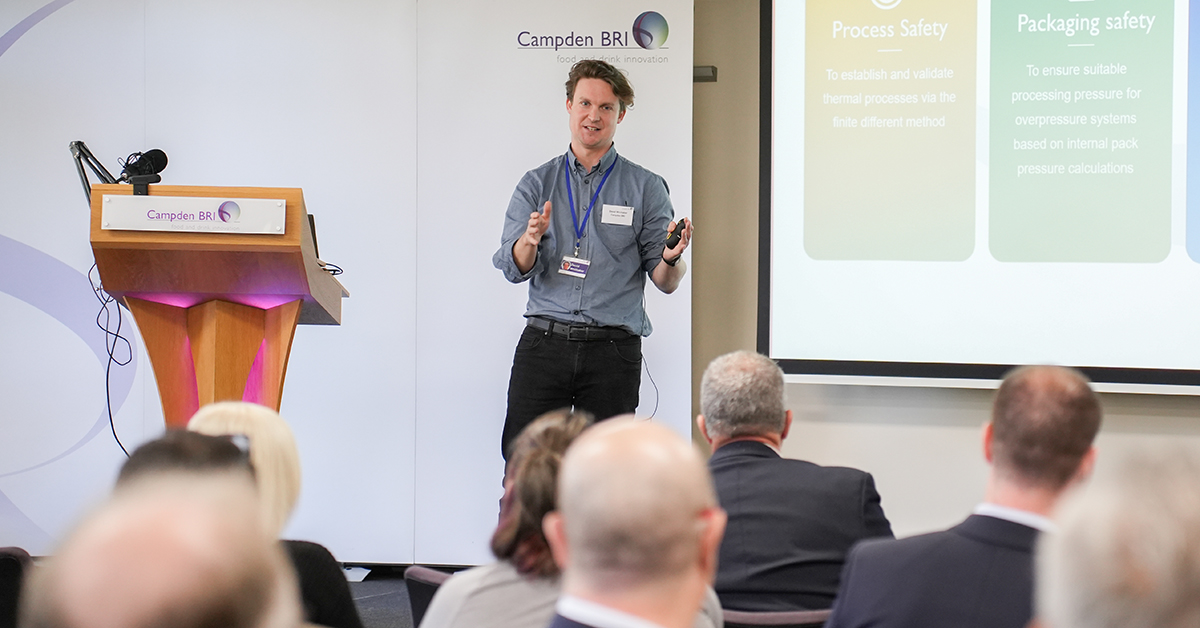
Key insights from our SafePlate 2024 event
21 October 2024 | David Whittaker, Process Innovation Lead
On the 3 October, we welcomed member delegates from across the world to our popular ‘SafePlate’ conference, aimed at driving quality and safety in the thermal processing industry.
Having kicked off proceedings the previous evening with a dinner and presentation from renowned ‘Angry Chef’ Anthony Warner, debunking many of the myths around ultra processed foods, the ‘Safe Plate’ event was strongly supported by prestigious experts in fields that included thermal processing, retort technology and mechanical engineering.
We are also appreciative of the support we had from our sponsors on the day. These included thermal processing solutions provider Holmach Ltd, and intelligent vision machine specialists Spookfish Innovations, whose technology is used in the quality inspection of industrial food processes.
Here is an overview of some of the key presentation sessions, topics and issues discussed.
Processing related R&D at Campden BRI
David Whittaker, Campden BRI
The day began with a presentation from our very own Process Innovation Lead, David Whittaker, talking members through what Campden BRI could offer them in terms of relevant Member Interest Groups (MIGs), thermal processing services and research and development projects.
MIGs
While providing a general flavour of what these groups can offer members including hot topic discussions, regulatory updates, networking and the opportunity to influence our future guidelines, David also provided a heads up on a new Preservation MIG planned for next year.
Although the date is yet to be confirmed, the session will be dedicated to all aspects of shelf-life extension and thermal and non-thermal approaches to this.
Thermal processing at Campden BRI
Next David touched on some of the key services we can offer members in the area of thermal processing that includes:
- Thermal Process Authority services
- Guidance on new and emerging process technologies
- Microbiological services
- Thermal process evaluation methods
Research and development
Attendees were also given an exclusive preview of a new smart process optimisation app that we have in development.
The software can predict product temperature profiles when changes are made to the environmental conditions or the initial product temperature.
Presenting a mock up interface of the app, David was able to demonstrate how the predicted product temperature curves can allow us to calculate:
- Lethality
- Energy cost
- Internal pressure
More generally, there are potentially wide-ranging benefits to be gained from its use in industry across areas that include process safety, packaging safety, the optimisation of thermal process cycles and energy cost savings.
The role of shelf-life extension in waste reduction
Brian Mayer, Holmach Ltd
Given current concerns around sustainability and cost of living issues, waste reduction is very much a hot topic. This issue is put even more sharply into focus when you consider that 16% of food waste comes from manufacturers and production plants.
Subsequently, it was very helpful to hear some of the key reasons why this is happening and how thermal processing offers a fix for some of these challenges that include short shelf-lives and consumer demand for perfection.
Besides breaking down some of the myths behind processed foods, attendees were taken through several examples to demonstrate how thermal processing and high-pressure pasteurisation techniques can provide a solution to reducing waste. These included shelf-life extension and improving the colour and appearance of some processed food products to help better meet consumer demand for perfection.
Delegates were left in no doubt that the narrative on processed food needs to change, as processing has a significant part to play in the ongoing battle against food shortage and wastage.
Handling and evaluating process deviation – a process authority’s perspective
Scot Cabes, TechniCAL
In this presentation, delegates were reminded about the criticality of commercial sterility, and how process deviations can harm that.
Whether we are talking about process deviations such as short process times, low process temperatures or a low initial product temperature, to critical factor deviations that can occur in retort machinery, containers or products in the inspection process, Scot outlined a range of scenarios that can affect thermal processes and methods for handling and evaluating deviations in retorted low acid canned foods from the stance of the Food and Drug Administration, who are the process authority in the US.
A novel process for agitated retorting
Dagbjørn Skipnes, Nofima
Next attendees were taken through a fresh approach to agitated retorting from a representative of The Norwegian Institute of Food, Fisheries and Aquaculture Research.
As many of you will know, processing times for retorting can be dramatically shortened through the agitation of liquid and semi-liquid products compared to static processing through end-over-end rotation of cans and axial rotation. However, while the latter axial rotation approach can be even more effective, as a technology it can also be more expensive.
Subsequently, delegates were given exclusive access to a brand-new technique that the institute is developing that can help in this area with a novel cyclical agitation.
So far, the new agitated retorting method has been successfully tested on a range of products including green peas, baby food and fish soup.
ImmersaFlow™ retort technology - description, current test results, and potential applications
Dr Scott Whiteside, Clemson University, SC, USA
In this presentation, attendees were introduced to yet another first for the industry. The ImmersaFlow™ retort technology is a new patented batch retort process from Stock America offering faster come up times with less variation of the heating medium than other batch retort processes.
Having tested the new ImmersaFlow™ in his lab, Dr Scott Whiteside, Professor at Clemson University (USA), took delegates through how the technology works and a series of impressive benefits and test results that it is able to produce.
Key benefits include:- Uniform heating and cooling
- Quick reheating capacity for process water
- High efficiency for densely packed loads
- Potentially higher throughput and increased control of product and lethality
- Reduced heating and cooling
In fact, users can potentially benefit from a 40% reduction in water when using ImmersaFlow™ compared to a full immersion system of similar size.
Thermal processing from a retailer perspective
Vivien Maitland, M&S
Vivien’s presentation offered a unique perspective of thermal processing from the food retailer’s point of view and highlighted why having codes of practice is so important to the safety and integrity of our food.
Vivien took delegates through the challenge for retailers such as M&S, in ensuring an adequate level of safety in the supply chain.
From variations in expertise throughout the supply chain and the ongoing threat of losing expertise, to the availability of multiple and novel technologies, the challenges are only increasing for retailers, and that is even before considering the many varied industries, manufacturers and countries that retailers need to manage. With regards to the issue of different countries, there is also the added risk that they are all adhering to different levels of food safety standards, where some may be much lower than others.
Talking through the M&S approach to this, attendees were given guidance about how to better meet these challenges and improve safety and quality.
Ultimately, we need to better understand the food systems suppliers use and know what questions to ask them in order to maintain this quality.
Panel discussion – how low can you go?
Speakers involved included David Whittaker, Campden BRI, Dagbjørn Skipnes, Nofima, Vivien Maitland, M&S and Scot Cabes, TechniCAL
In this session, our panel of experts took the opportunity to explore the feasibility of reducing safety margins in thermal processes, while ensuring product safety. They were asked to assess how achievable this was, as well the potential risks of changing safety measures.
Potential movement on reducing safety margins – but with conditions
Having been asked for their perspectives on current safety margins, before being pressed on the question of reducing safety margins, the general consensus was that there could be some flexibility, but with caveats.
From tightening up controls through the use of heat penetration tests and ensuring better work controls over retorts, to the prevention of overloading raw materials, there was an overall feeling that only an improved understanding of process controls and equipment could help us to move closer to the margins of these food safety limits.
Possible pitfalls
The speaker panel were also tasked to consider some of the potential pitfalls of changing temperature safety margins.
While things can always go wrong, which is why we have all our existing regulations, the panel cited several areas and scenarios where the risks could be increased by altering safety margins.
From automation complacency where people do not always fully understand the risks of the machines they are working with, to experience gaps when people retire, leading to an increased risk of mistakes when new people join that do not have the knowledge of their predecessors. Delegates were informed that if they did consider reducing safety margins in their thermal processes, it is critical to never lose sight of existing regulations and always be responsible and respectful towards them.
A novel pseudo continuous retort concept
Sergio Bertomeu, Surdry retorts
In the final presentation for the day, attendees were introduced to a new retort technology concept, based on in-container sterilisation.
Given rising costs in Europe, everyone operating in the region understands the importance of low energy consumption and trying to reduce their water consumption. Therefore, any new retort technologies that can help with this will be an attractive proposition.
Taking delegates through a couple of business case examples, one for black olives in pouches and the other green beans in cans, it quickly became obvious what potential savings could be generated using Surdry’s low energy and low water consumption unit.
Compared with more traditional water spray heating and cooling systems, the Surdry concept could generate up to 30% more steam savings.
How we can support you with thermal processing challenges
To sum up, the event went really well. Attendees were not only able to hear about the latest in retorting technologies, industry challenges and research, but participate in the questions at the end of each session. The panel discussion in particular generated a lot of healthy debate on the conference floor. In addition, delegates had lots of opportunities to network with peers both old and new.
At this point it is helpful to remind you of the professional support we can offer to ensure your thermal processes consistently produce safe products.
Having been at the forefront of the food and drink thermal processing industry for more than 100 years, our team holds extensive experience in supporting processors within the UK and around the world. We regularly work with some of the world’s largest food and drinks companies, offering you the assurance that when you approach us, you will be in safe hands.
Our thermal processing team at Campden BRI can support you in three main ways including thermal process validation, processing consultancy and thermal process training.

About David Whittaker
David is a thermal and non-thermal processing specialist and has expertise across many food and beverage sectors.
David also delivers many thermal processing training courses and has a real passion for communication in this area, having spoken at several conferences and seminars on the topic, as well as contributing to Campden BRI guidelines.
How can we help you?
Have you got a pressing question on thermal processing that you need answering?
Want to enhance your thermal processing skills?
Take a look at the wide-ranging courses we offer in the field of thermal processing, both online and face to face.







